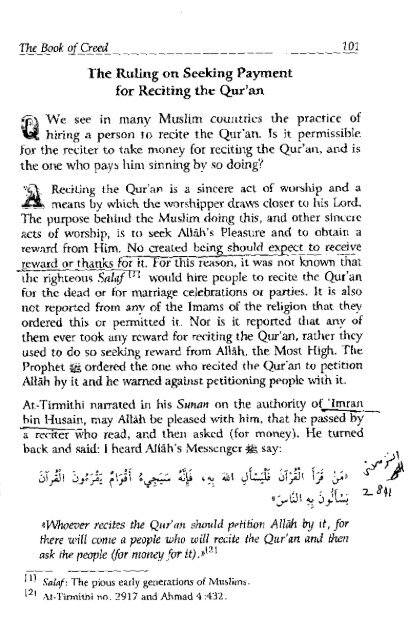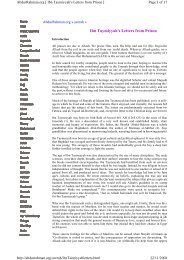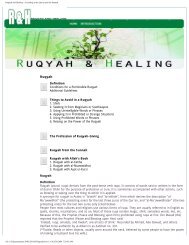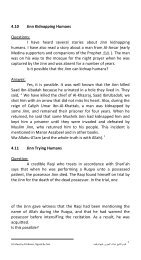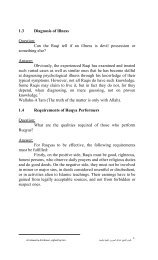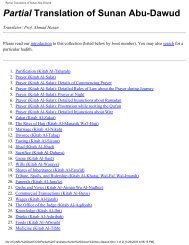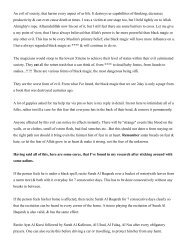Taking Payment / Receiving money for Ruqyah
Taking Payment / Receiving money for Ruqyah
Taking Payment / Receiving money for Ruqyah
Create successful ePaper yourself
Turn your PDF publications into a flip-book with our unique Google optimized e-Paper software.
The Book oj ______________--------<br />
Creed 101<br />
'The Ruling on Seeking <strong>Payment</strong><br />
<strong>for</strong> Reciting the Qur'an<br />
q- We see in maw Muslim cuu~~trius the practice of<br />
hiring a person io recite thr Qur'an. Is it permissible<br />
f0.r the reciter to take <strong>money</strong> <strong>for</strong> reciting the Qur'an, and is<br />
the one who pa.ys him sinning b!~ so doing:'<br />
',:- ,,,,<br />
A<br />
Reciting the Qur'an is a sincere act af worsl~ip and a<br />
-.-L means try which the worshipper dri~m closer tu his Lord,<br />
The purpose behirid thc Muslim doing this, and other sirlcere<br />
acts of worship, is IC) seek AIM'S Pleasure and to obtain a<br />
reward from Him. No creakd being should expect to receive<br />
~ward or thBks fG it. For this mason, it w7as nor known t.hat<br />
thc righteo~l~ .wl wo~lld hire people to recite thc Qur'an<br />
L, " - -<br />
<strong>for</strong> the dead ot <strong>for</strong> marria~ celebrations or parties. It is also<br />
not reported !?om any of the lrnams of the religion hat they<br />
ordered this or permitted it. Nor is it reported that any of<br />
them ever took any rcward <strong>for</strong> reciting the Qur'm, raher thcy<br />
used to do so seeking reward from All~h, the Most High. Tibe<br />
Prophet ordered the ow rvho recited the Qur'an tu petit~on<br />
Atl5h hy it and he warned agai~ist petitioning p~opie with it.<br />
At-Tirmithi narrated in his Sunan on the authority oC1rnr~11<br />
hin Husain, may All& be pleased with him, that he passed by -<br />
a rcriter who read, and then askcd (<strong>for</strong> mnney). He turned<br />
back and said: I heard ,4lldh's ,Messenger &a say:<br />
.' 11<br />
rWhoexr r ~cif~ ~ J K Qitr'njr sha~rId p~fition All& hj tt, <strong>for</strong><br />
there will cmze 0 people who will rccite the Q~tr'an irnd flzetl<br />
ask th~ pqia @r nimq tor it). p"'<br />
--- -----<br />
I<br />
Sakf: Tht pious early vnemtions of Muslims.<br />
12' At-Tirrnithi no. 7917 and Ahmad 4 432.
Fatawa Islamiyah<br />
Abu Sa'id, may All& be pleased with him, who accepted a<br />
..<br />
part of a sheep as a payment <strong>for</strong> curing someone by reciting<br />
-A<br />
Srtrrrh Al-Fatilrah. There is also the Haditlz of Sahl, may Allah<br />
The Permanent Committee<br />
The Appearance of Mahdi<br />
What is your opinion about the promised person, Al-<br />
future appearance?<br />
(Prophetic traditions) verifying the advent of the expected<br />
Mahdi, the Pseudo-Messiah and the Mrssrah. Certain signs<br />
will precede his advance; thr ~nmt significant of which is that<br />
Re \nil make just~ce prevail on earth after the<br />
of<br />
injustice and tyranny. It 1s not permissible today <strong>for</strong> anvone to<br />
allege that a certain pcrson is the Mahdi until his signs that<br />
the Prophct g <strong>for</strong>etold have appeared such as the one<br />
mentioned above.<br />
The Permanent Committee
1 <br />
<br />
Abili<br />
2 & 3<br />
1.12 No <strong>Payment</strong> of Fees Without Cure<br />
Question:<br />
In one of your Fatawas concerning receiving fees <strong>for</strong><br />
<br />
per<strong>for</strong>ming a Ruqya on condit<br />
Is this condition applicable to the medical doctor?<br />
Compared to the licence to take fees <strong>for</strong> recitation, is it allowed to<br />
<br />
recitation unto oil and health water?<br />
Answer:<br />
As Abu-Saeed Al- <br />
<br />
on a charge worth a flock of sheep if cured. Regarding the wages<br />
(sheep) received <strong>for</strong> the Ruqya, the Prophet said to those<br />
<br />
1<br />
<br />
<br />
Sahih Al-Bukhari, Kitab Ahadith Al-<br />
2<br />
Sahih Muslim, Kitab Assalam (Book of Peace), Hadith No. 2202. <br />
3<br />
A Fatawa by Al-Jibreen, sighed by him.
1 <br />
2 Concerning the doctor, if he emands fixed fees, cure<br />
becomes a condition, except in the case of agreement of paying the<br />
expenses of treatment and medicines. Concerning incantations, they<br />
are basically Ruqyas, i.e. recitations with Nafth unto the patient,<br />
<br />
can be compared to medicines, and, there<strong>for</strong>e, fees can be charged<br />
<strong>for</strong> doing them. Similarly, the actual price of oil or health water on<br />
which recitation is done can be charged without additions. 3<br />
1.13 The Body Parts Through Which Devils enter and<br />
Possess Humans<br />
Question:<br />
While per<strong>for</strong>ming Ruqyas, some Raqis command the devil<br />
to get out of the possessed patient. Sometimes the devil asks to exit<br />
through, <strong>for</strong> example, the eye or the ear, but the Raqi fefuses lest<br />
<br />
instructs the devil to exit through the mouth or toes.<br />
<br />
<br />
Answer:<br />
It is true that the devil possesses the human and controls all<br />
his body. Obviously, it can enter through all body parts, and<br />
1<br />
<br />
Sahih Al-Bukhari, Kitab Attib (Book of Medicine), Hadith No. 5749 & Sahih Muslim, Kitab Asslam (Book of<br />
Peace), Hadith No. 2201.<br />
2<br />
<br />
Sahih Al-Bukhari, Kitab Attib (Book of Medicine), Hadith No. 5737.<br />
3<br />
A Fatawa by Al-Jibreen, signed by him.
1.19 Repeating the Ruqya a Hundred Times<br />
Question:<br />
There is a Raqi who has <br />
known <strong>for</strong> his piety and righteousness, and uses <strong>for</strong> Ruqyas only the<br />
<br />
too many times; <strong>for</strong> example, he may repeat the Fatiha a hundred<br />
times or more, while believing that the number of times is not in<br />
itself the source of healing.<br />
What is the ruling regarding such repetition? Is it alien to<br />
Islam?<br />
Answer:<br />
There is no objection to repetition, whether it is counted or<br />
dance and a mercy to<br />
<br />
a<br />
beneficial treatment, provided that both the Raqi and the patient are<br />
faithful, righteous persons. It is important that they be aware of the<br />
meanings of the verses and prayers being recited. 1<br />
1.20 <strong>Receiving</strong> Non-Conditional Fees, but <strong>for</strong> Charity<br />
Purposes<br />
Question:<br />
Is a Raqi who fulfils legal requirements in terms of faith,<br />
piety and righteousness allowed to receive fees <strong>for</strong> per<strong>for</strong>ming<br />
<br />
<br />
charges, but uses what is given to him <strong>for</strong> his own expenses as well<br />
as charity purposes? What is the supporting evidence? If it<br />
A Fatawa by Al-Jibreen, signed by him.<br />
1
is allowed, does it undermine the value of the Ruqya if the fees are<br />
fixed be<strong>for</strong>ehand?<br />
Answer:<br />
There is no objection to taking fees <strong>for</strong> per<strong>for</strong>ming Ruqyas<br />
on condition that healing occurs. This ruling finds support in the<br />
story and Hadith related by Abu-Saeed Al-Khudri. According to<br />
Abu- <br />
tribe and requested to be their guests, but the tribe refused. At that<br />
time, the chief of the tribe happened to be stung (or bitten), and he<br />
was given all sorts of treatment, but all in vain. Some of his<br />
<br />
<br />
o treat with a<br />
Ruqya, but, by Allah, we asked you to receive us as your guests, but<br />
you refused. I will not treat your patient with a Ruqya till you fix<br />
<br />
travellers a flock of sheep. The man started doing Nafth (on the<br />
painful spot) and reciting Al-Fatihah till the patient was healed and<br />
started walking as if he had not been sick. 1 The group got their<br />
wages <strong>for</strong> the Ruqya. When told the story, the Prophet said to<br />
p amongst you) and assign a share <strong>for</strong><br />
2<br />
<br />
and his demand <strong>for</strong> a share <strong>for</strong> himself represent the evidence that<br />
allows laying wage conditions <strong>for</strong> Ruqyas. The Ruqyas themselves<br />
must be of the legal type, otherwise they are invalid. Also, cure<br />
from ailment is necessary <strong>for</strong> payment of wages.<br />
1<br />
Al-Fatiha Sura, Ayah 2.<br />
<br />
2<br />
<br />
Sahih Al-Bukhari, Kitab Attib (Book of Medicine), Hadith No. 5749 & Sahih Muslim, Kitab Asslam (Book of<br />
Peace), Hadith No. 2201.
However, it is recommended that no wage conditions be laid <strong>for</strong><br />
per<strong>for</strong>ming Ruqyas, and that they be done <strong>for</strong> helping fellow<br />
Muslims in sickness and suffering. If patients willingly decide to<br />
pay something, the Raqi can take it. If paid too much, he should<br />
return the extra. Should he decide to fix a wage be<strong>for</strong>ehand, it<br />
should not be high, but reasonable enough to cover his basic<br />
expenses. 1<br />
1.21 Doing Recitations unto Water, Oil and Ointment &<br />
Using Saffron in Writing Prayers<br />
Question:<br />
Some Raqis do recitations unto water, oil, ointment or<br />
cream. They also write prayers in saffron on a piece of paper, soak<br />
the piece of paper in water and have the patients drink the water or<br />
wash their bodies with it. Pieces of paper with such payers are<br />
<br />
<br />
Answer:<br />
According to a Hadith interpreted by Muhammad Ibn-<br />
Abdilwahab, the Prophet <br />
<br />
2 Only<br />
non-Shirk Ruqyas are allowed.<br />
The Prophet <br />
your Ruqyas. They 3 He<br />
<br />
1<br />
A Fatawa by Al-Jibreen, signed by him.<br />
<br />
2<br />
<br />
<br />
Sunaj Abu-Daweed, Kitab Attib (Book of Medicine), Hadith No. 38833.<br />
3<br />
Sahih Muslim, Kitab Assalam (Book of Peace), Hadith No. 2200.
would likely be brought into undeservedly degrading situations,<br />
particularly in such places as toilets. 1<br />
1.31 <strong>Taking</strong> Ruqya Wages to Avoid Asking Others <strong>for</strong> Help<br />
Question:<br />
I work as a preacher and Imam (prayer leader) in a mosque<br />
where I have established a library, which has a good number of<br />
valuable Sunnah books. There, I also teach Hadith, Fiqh (Islamic<br />
jurisprudence), Tawheed (Oneness of Allah), and Tafseer<br />
h legal Ruqyas<br />
<br />
companions, and as Angel Jibreel may His peace be upon him -<br />
did unto him. When doing Ruqyas, I never violate the Sunnah. The<br />
Ruqyas I often use are taken from Ibn-Taymiya <br />
Idhah Addalalah Fi Umoom Arrisalah, and Ibn-Al-<br />
books, such as Zad Al-As you know, Ruqya treatment is an<br />
established element of Sunnah.<br />
I am not denying that I take wages <strong>for</strong> treating with<br />
Ruqyas. This is based as you very well know - on the Hadith<br />
narrated by Abu-Saeed Al-Khudri 2 regarding the license to per<strong>for</strong>m<br />
Ruqyas and charge fees in return. One reason why I accept fees is<br />
that I do not want to be dependent on others <strong>for</strong> a living,<br />
particularly that I am blind, have family responsibilities and do not<br />
have a regular job. Another reason is my awareness of its legality.<br />
Nonetheless, there are those who, out of ignorance, object to my<br />
taking such fees, yet, do not present evidence to support their<br />
objection.<br />
I beg you to clarify this issue so that I can be enlightened<br />
with respect to my duties and to such unqualified, objections.<br />
-210.<br />
Op. Cit.<br />
1<br />
<br />
2
Should you see that what I am doing is wrong, I trust you will<br />
convincingly make that clear to me, and I promise to abide by your<br />
verdict.<br />
Answer:<br />
If - as you have stated - you are treating with legal Ruqyas,<br />
<br />
Sunnah, and if you consult Ibn- - <br />
writings - may Allah have mercy on their souls - as well as other<br />
writings by Ahlus-Sunnah-wal-<br />
and should be appreciated As <strong>for</strong> Ruqya<br />
wages, you are allowed to take them as verified by the Hadith to<br />
which you have referred.<br />
May Allah reward you <strong>for</strong> what you are doing in the line<br />
of preaching, guiding, teaching, leading prayers, establishing a<br />
library with valuable books written by Ahlus-Sunnah- <br />
and serving your brethren. May He guide you to more good deeds<br />
and make you dependent on nobody but Him Allah - may He be<br />
praised - is near mankind, and He hears all prayers May His prayers<br />
be upon Prophet Muhammad , his kin and his Companions. 1<br />
1.32 The Validity of Ruqyas<br />
Question:<br />
What is the Islamic position regarding Ruqyas9 I have<br />
<br />
Ruqya, and he was given some sheep in return This was<br />
approved by the Prophet <br />
1<br />
<br />
27, p. 57 58.
similar prayers in the belief that they are only a means and that only<br />
Allah, the Exalted, is the source of all harm, all benefit and all<br />
healing. The Prophet himself per<strong>for</strong>med Ruqyas unto others and<br />
<br />
1 There<strong>for</strong>e, if they violate this requirement, they<br />
are <strong>for</strong>bidden.<br />
As <strong>for</strong> amulets, according to relevant Hadiths, they are not<br />
a 2<br />
1.49 <br />
Sake<br />
Question:<br />
<br />
<br />
Answer:<br />
ot only<br />
allowed, but also recommended, <strong>for</strong> the Prophet <br />
3 He and his<br />
Companions per<strong>for</strong>med Ruqyas. Though allowed, wages would<br />
<br />
instead.<br />
However, it is not valid of the Raqi to intend the reward to<br />
go to the patient; there is no evidence in Islam to suggest this. In<br />
this regard, the Prophet <br />
4 & 5 1<br />
Sahih Muslim, Op. Cit.<br />
<br />
2<br />
<br />
3<br />
Sahih Muslim, Op. Cit.<br />
<br />
4<br />
<br />
Sahih Al-Bukhari, Kitab Assulh (Book of Reconciliation), Hadith No. 2697 & Sahih Muslim, Kitab Al-Aqdhiyah<br />
(Book of Court Cases), Hadith No. 1718.<br />
5<br />
<br />
27, pp. 58.
1.67 Doing R <br />
Return<br />
Question:<br />
<br />
Is the Raqi allowed to take wages or presents <strong>for</strong> per<strong>for</strong>ming<br />
Ruqyas?<br />
Answer:<br />
<br />
it is consistent with the established Sunnah; according to it,<br />
recitation and Nafth are done on the patient or on the painful spot.<br />
They may be also done on water to be drunk by the patient. The<br />
Prophet conducted Ruqya treatment, was treated with it and<br />
instructed Muslims to do it.<br />
Assyuti mentioned that the Ulama are agreed on that<br />
Ruqyas are allowed on three conditions: they must invoke nothing<br />
<br />
comprehensible and in Arabic; and it must be believed that Ruqyas,<br />
in themsel <br />
permission.<br />
According to Mohammad Ibn-Abdulwahab, only the non-<br />
Shirk Ruqyas are allowed; they were prescribed by the Prophet as<br />
treatment <strong>for</strong> the evil eye, scorpion stings and snake bites. In these<br />
cases Ruq<br />
wages <strong>for</strong> per<strong>for</strong>ming Ruqyas, <strong>for</strong> the Prophet approved of that on<br />
one occasion, when his companions charged fees <strong>for</strong> a Ruqya they<br />
<br />
m 1 1<br />
Op. Cit.<br />
<br />
<br />
<br />
-
Ruqya, as mentioned by scholars such as Ibn-Tairniyah 1 and Ibn-<br />
Al-Qayyim 2 . However, priority should be given to direct Ruqya,<br />
i.e. direct recitation and Nafth on the patient or on the painful spot;<br />
this is considered better.<br />
As <strong>for</strong> taking wages <strong>for</strong> writing Ruqyas as mentioned<br />
above, it is allowed to do so, <strong>for</strong> the Prophet permitted it in case the<br />
Sahaba who took wages in return <strong>for</strong> the Ruqya per<strong>for</strong>med on the<br />
stung chief. 3 & 4<br />
1.74 It Is Not Allowed to Open Specialist Clinics <strong>for</strong> Ruqya<br />
Treatment<br />
Question:<br />
What do you think of opening specialist clinics <strong>for</strong> Ruqya<br />
treatment?<br />
Answer:<br />
This should not be allowed, <strong>for</strong> it will open the door <strong>for</strong><br />
temptations and cheating. Besides, the Righteous Salaf never did<br />
such a thing. Also, expansion of clinics of that type would be a<br />
source of evil and corruption because the unqualified and the<br />
greedy will be attracted to it as some type of lucrative business.<br />
Such people will also try to get as many customers as possible, even<br />
by unlawful means. To defend such business by saying that the<br />
Raqi in charge is a righteous man is unacceptable, <strong>for</strong> man is<br />
Ibn--Fatawa (Collection of Fatwas), 19/64,65.<br />
Ibn-Al--<br />
1<br />
<br />
2<br />
<br />
. 3<br />
<br />
Sahih Al-Bukhari, Kitab Attib (Book of Medicine), Hadith No. 5749 & Sahih Muslim, Kitab Assalam (Book of<br />
Peace), Hadith No. 2201.<br />
4<br />
<br />
Al-Mutaqa mm Fatawa Al-Fawzan (Al-.
not immune from temptations. Even if the Raqi is really righteous,<br />
opening that door should not be allowed. 1<br />
1.75 <br />
Question:<br />
I am a twenty-year-old girl. Thanks be to Allah, I believe<br />
in Him. For the last three or four years, I have been psychologically<br />
ill, suffering from Waswasah (evil whispers / promptings of Satan)<br />
so much that I feel I am nearing madness. So far, I have not been<br />
able to get rid of my illness. I want to know if Allah tests people by<br />
<br />
whispers? I need your advice.<br />
Answer:<br />
In fact, Waswasah is a serious illness caused by Satan,<br />
who connives to disturb, mislead and distract people from the<br />
worship of Allah. There<strong>for</strong>e, He commanded Prophet Muhammad<br />
to seek His protection from Waswasah. As expressed in Annas<br />
Sura:<br />
<br />
King of mankind, (3) The God of mankind, (4) From the evil of<br />
the sneaking whisperer, (5) Who whispereth in the hearts of<br />
<br />
Thus, Satan does Waswasah to humans and believers in<br />
particular. However, it can be treated in two ways:<br />
1. by paying no attention to it and completely dismissing it as<br />
something from Satan, who cannot harm; and<br />
2. <br />
keeps Satan away. In the absence of such remembrance,<br />
1<br />
<br />
Al-Mutaqa mm Fatawa Al-Fawzan (Al-8.
1.8 Slandering the Raqi after Alleged High <strong>Payment</strong><br />
Question:<br />
Having received a Ruqya from a Raqi known <strong>for</strong><br />
righteousness and goodness, a patient paid some fees. Later, the<br />
patient began to think that he had paid too much, which led him to<br />
slander the Raqi out of envy.<br />
What is the Islamic ruling on this situation?<br />
Answer:<br />
Regarding mattes of Ruqya fees, it is recommended to do<br />
<br />
Muslims and eliminating their suffering. The Raqi should not<br />
demand fees, but should leave it to his patients. If they pay him a<br />
lot, he should not take it all, and if they give him less, he should not<br />
ask <strong>for</strong> more. Such a moral state is conducive to effective Ruqyas.<br />
The patient, on the other hand, should not go back on what he has<br />
done once he voluntarily gives a payment as fees, a present or a<br />
donation. In this regard, the Prophet <br />
1 The<br />
same image is expressed by another Hadith, but the comparison is<br />
with a dog doing that. 2 The narrator of the Hadith remarked that<br />
doing that with vomit was <strong>for</strong>bidden.<br />
Regarding the matter of slandering the Raqi, it is<br />
considered an injustice, a lie and a false accusation, which is a<br />
<br />
1<br />
<br />
Sahih Al-Bukhari, Kitab Al-Hibah (Book of Gifts), Hadith No. 2621 & Sahih Muslim, Kitab Al-Hibat (Book of Gifts),<br />
Hadith No. 1622<br />
2<br />
Sahih Al-Bukhari, Kitab Al-Hibah (Book of Gifts), Hadith No. 2622
message <br />
mankind because of that which Allah o His bounty has bestowed<br />
1 As fire burns straw, so does envy with rewards.<br />
There<strong>for</strong>e, the patient in that situation had better repent and<br />
abandon injustice and envy. 2<br />
1.9 Having a Group of women <strong>for</strong> Ruqyas<br />
Questions:<br />
Is a man Raqi allowed to per<strong>for</strong>m an Ruqya unto a group<br />
of women in one place, where their Mahrams (relatives <strong>for</strong>bidden in<br />
marriage) are available in case their own women go epileptic or<br />
faint?<br />
Answer:<br />
It is not <strong>for</strong>bidden <strong>for</strong> a man Raqi to per<strong>for</strong>m a group<br />
Ruqya <strong>for</strong> an assembly of women. It is the presence of a man and a<br />
non-Mahram woman on their own that is <strong>for</strong>bidden. Accoding to<br />
<br />
tog 3 <strong>for</strong> such a task, the Raqi<br />
must be a trustworthy person of religious commitment, faith and<br />
righteousness. He has to limit his Ruqya to recitation and prayers<br />
body.<br />
<br />
help is needed. 4<br />
(Wallahu-<br />
1<br />
An- 54<br />
2<br />
A Fatawa by Al-Jibreen, sighed by him.<br />
<br />
3<br />
<br />
<br />
Sunaj Al-Tirmidhi, Kitab Al-Fitan (Book of Temptations) Hadith No. 2165.<br />
4<br />
A Fatawa by Al-Jibreen, sighed by him.


